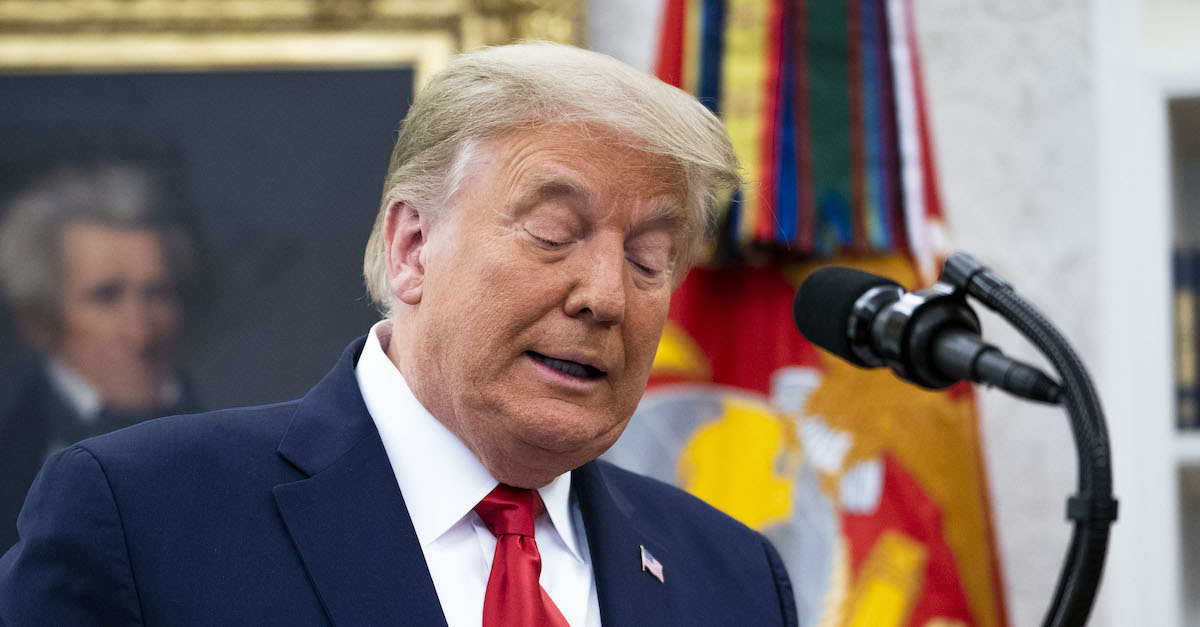
Donald Trump’s defense team was accused of flagrantly misrepresenting the work of a constitutional scholar when asserting that the former president’s impeachment is unconstitutional.
Attorneys representing Trump filed a legal brief on Monday arguing that the U.S. Constitution only allows for the impeachment of sitting officials and therefore cannot be utilized against a president who has already left office. Similar to the House Impeachment Managers’ pre-trial filing, the brief relied heavily on a highly-regarded 2001 academic article on late impeachments by Michigan State University law professor Brian Kalt. Unfortunately for Trump’s attorneys, Kalt—who is widely viewed as the leading expert in constitutional law dealing with the presidency, presidential pardons, impeachment, succession, and the 25th Amendment—immediately responded to the memo by saying it repeatedly distorted and misrepresented his work.
“Trump’s brief cites my 2001 article on late impeachment a lot,” Kalt wrote in a four-part Twitter thread. “The article favored late impeachability, but it set out all the evidence I found on both sides–lots for them to use. But in several places, they misrepresent what I wrote quite badly.”
The 133-page article, titled “The Constitutional Case for the Impeachability of Former Federal Officials: An Analysis of the Law, History, and Practice of Late Impeachment,” is an exhaustive analysis of the history and law relevant to the issue which ultimately concludes that there is a “solid basis” for post-presidential impeachments.
But that’s not how Trump’s lawyers Bruce L. Castor, Jr., David Schoen, and Michael T. van der Veen portrayed Kalt’s work.
“They suggest that I was endorsing an argument when what I actually did was note that argument–and reject it,” Kalt wrote, specifically citing footnote 57 of Trump’s impeachment memo.
That footnote reads: “As Brian Kalt explains, ideas like requiring a two-thirds majority to convict in the Senate are not self-evident, which is why the Framers took the time to spell them out. Late impeachment, so the argument goes, which is also not self-evident, would have also required specification if the Framers wished to include it as a possibility.”
But in his article, Kalt clearly reaches the opposite conclusion.
“A critic of late impeachment could argue that things like two-thirds majority requirements are not self-evident and, therefore, require specification, and that late impeachment is similarly counterintuitive and also requires specification,” Kalt wrote. He then noted that several state constitutions made specific references to late impeachment, but only “in the context of limiting it” and while simultaneously using “language that suggested that late impeachment was otherwise implicitly permissible.”
“Therefore, allowing late impeachment is the self-evident proposition, not the counterintuitive one, and failure to explicitly bar it while specifying other limitations on the impeachment power is a telling omission,” he concluded.
Kalt went on to say that there are “multiple examples of such flat-out misrepresentations” in the Trump memo, highlighting “the worst” such instance as the contention that his work espoused the theory that “when a president is no longer in office, the objective of an impeachment ceases,” a notion expressly rejected as “deeply flawed” in the article.
“If removal were the only possible judgment in impeachment cases, [this] interpretation would be more likely. But removal is not the only possible judgment mentioned in the text; disqualification is possible too,” the article stated. “Removal is a mandatory sentence for sitting officers upon conviction, but it is not the sole end of impeachment.”
In an email to Law&Crime, Kalt said the misrepresentation of his work tainted the credibility of Trump’s attorneys before the trial has even begun.
“In a typical legal case, one of the worst things a lawyer who values his or her credibility can do is to cite authorities that actually say the opposite of what the lawyer claims,” he said. “An impeachment trial is unlike a typical legal case in a lot of ways, but I hope that this is not one of them. I hope that the senators realize what it means when lawyers misuse sources in this way.”
Kalt is not the only legal scholar to issue a response like this.
Law&Crime reached out to Trump’s legal team by email regarding Kalt’s comments, but we have not yet heard back.
[image via Doug Mills-Pool/Getty Images]